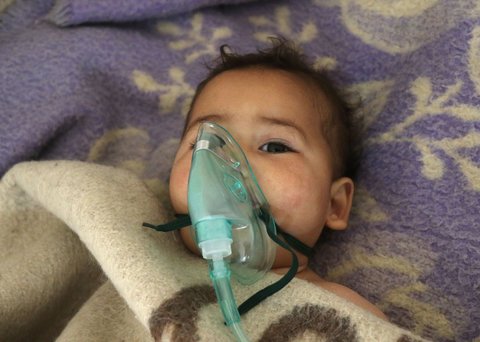President Trump’s air strikes against Syria were of dubious legality. They were hypocritical. They may have had political motivations.
But most of all, they were right.
I’m deeply suspicious of Trump’s policies and competence, but this is a case where he is right and Barack Obama was wrong. Indeed, many of us believe that Obama’s worst foreign policy mistake was his passivity in Syria.
But Trump changed US policy 180 degrees after compelling photos emerged of children gassed in Syria. Should a president’s decisions about war really depend on the photos taken?
Here’s why I believe he was right.
Since the horrors of mustard gas during World War I a century ago, one of the world’s more successful international norms has been a taboo on the use of chemical weapons. We all have an interest in reinforcing that norm, so this is not just about Syria but also about deterring the next dictator from turning to sarin.
For an overstretched military, poison gas is a convenient way to terrify and subdue a population. That’s why Saddam Hussein used gas on Kurds in 1988, and why Bashar al-Assad has used gas against his own people in Syria. The best way for the world to change the calculus is to show that use of chemical weapons carries a special price — such as a military strike on an airbase.
Paradoxically, Assad may have used chemical weapons because he perceived a green light from the Trump administration. In recent days, Rex Tillerson, Sean Spicer and Nikki Haley all suggested that it was no longer American policy to push for the removal of Assad, and that may have emboldened him to open the chemical weapons toolbox. That mistake made it doubly important for Trump to show that neither Assad nor any leader can get away with using weapons of mass destruction.
Look, for a Syrian child, it doesn’t matter much whether death comes from a barrel bomb, a mortar shell, a bullet, or a nerve agent. I hope Trump will also show more interest in stopping all slaughter of Syrians — but it’s still important to defend the norm against chemical weapons (the United States undermined that norm after Saddam’s gas attack by falsely suggesting that Iran was to blame).
Critics note that Trump’s air strikes don’t have clear legal grounding. But Bill Clinton’s 1999 intervention to prevent genocide in Kosovo was also of uncertain legality, and thank God for it. Clinton has said that his greatest foreign policy mistake was not intervening in Rwanda during the 1994 genocide; any such intervention also would have been of unclear legality — and the right thing to do.
There are risks ahead, of Russia or Syria targeting American aircraft or of Iran seeking revenge against Americans in Iraq. War plans rarely survive the first shot, and military interventions are easier to begin than to end. But as long as we don’t seek to topple Assad militarily, everybody has an interest in avoiding an escalation.
Many of my fellow progressives viscerally oppose any use of force, but I think that’s a mistake. I was against the Iraq war, but some military interventions save lives. The no fly zone over northern Iraq in the 1990s is one example, and so are the British intervention in Sierra Leone and French intervention in Mali. It’s prudent to be suspicious of military interventions, but imprudent to reject any use of force categorically.
Want proof that military interventions in the Middle East can work? In 2014, Obama ordered air strikes near the Syria-Iraq border against ISIS as it was attacking members of the Yazidi minority. Those US strikes saved many thousands of Yazidi lives, although they came too late to save thousands more who were killed or kidnapped as slaves.
In Syria, the crucial question is what comes next.
There’s some bold talk among politicians about ousting Assad from Syria. Really? People have been counting on Assad’s fall for six years now, and he’s as entrenched as ever.
Moreover, if this was a one-time strike then the larger slaughter in Syria will continue indefinitely. But I’m hoping that the administration may use it as a tool to push for a ceasefire.
The New York Times
